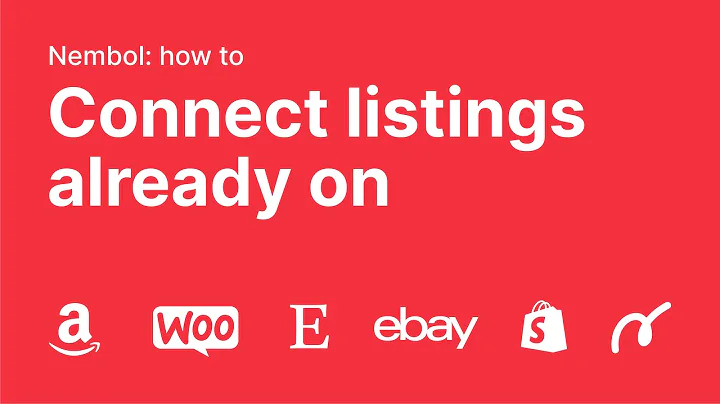Find the Perfect Alternative to Shopify: Top 10 Picks!
Table of Contents:
- Introduction
- Reasons for looking for Shopify alternatives
- Features to consider when choosing an e-commerce platform
- Adobe Commerce
- Ecwid
- Selz
- Squarespace
- Wix E-commerce
- Shift4Shop
- Pinnacle Cart
- WooCommerce
- BigCommerce
- Shopfunnels
- Comparison of the top Shopify alternatives
- Conclusion
Article
10 Shopify Alternatives for Your E-commerce Store
Introduction
Shopify is undoubtedly a popular e-commerce platform, widely used by individuals and businesses to create and manage online stores. However, it's essential to explore alternative options that may be better suited for your specific needs. In this article, we will discuss ten Shopify alternatives and explore their features, pros, and cons.
Reasons for looking for Shopify alternatives
There are various reasons why someone might want to explore alternative e-commerce platforms instead of Shopify. Here are some common motivations:
-
Flexible Payment Options: Shopify Payments, the default payment gateway on Shopify, comes with transaction fees if you choose not to use it. Many users prefer platforms that offer a wider variety of payment processing options without additional fees.
-
Customizable SEO: While Shopify offers basic SEO features, you might require more control over optimizing your website for search engines. Some alternative platforms provide advanced SEO customization options.
-
Complex Product Catalog: If you have a large, intricate product catalog with numerous size variations, colors, and designs, Shopify's limitations on SKUs per product and options might not suffice.
-
Frustration with Shopify: Users may feel frustrated with certain aspects of Shopify, such as its Help Center, customer support, or previous negative experiences, prompting them to explore alternative e-commerce platforms.
Features to consider when choosing an e-commerce platform
When evaluating alternative e-commerce platforms, here are some essential features to consider:
-
Multiple Payment Options: Ensure that the platform offers a wide variety of payment processing providers and the ability to transact and settle in multiple currencies.
-
Customization Opportunities: Look for platforms that allow easy customization without the need for extensive coding knowledge. Drag-and-drop website builders can be valuable in this regard.
-
Scalable Catalog Management: If you anticipate a growing product catalog, ensure that the platform can handle the scalability of your business. Consider the number of SKUs per product and options allowed.
Now, let's dive into the top 10 Shopify alternatives and explore their unique features, pros, and cons.
1. Adobe Commerce
Adobe Commerce, previously known as Magento, is an ideal platform for mid-size to large businesses with sufficient in-house programming resources. It offers advanced customization features, allowing businesses to tailor the platform to their specific needs. However, using Adobe Commerce requires technical expertise, and additional costs may be incurred for hosting, domain, security certificates, and extensions. Pricing for Adobe Commerce starts at $22,000 per year, depending on your annual gross sales revenue.
2. Ecwid
Ecwid, an acronym for "e-commerce widget," is a platform designed for creatives and small business owners looking for a user-friendly solution. It offers a free customizable instant site and also integrates seamlessly with existing websites and platforms like Facebook and Amazon. The Forever Free plan allows you to start with a limited number of products, and you can upgrade to premium plans as your business grows. There are no transaction fees on any Ecwid plan.
3. Selz
Selz is an e-commerce platform specifically geared towards digital product sales. It is an excellent choice for artists selling illustrations, music, or video courses. Selz offers both a cloud-based solution and a Basic plan that allows embedding products and buy buttons onto existing websites. Pricing for Selz ranges from $22 to $119 per month, and it comes with a 14-day free trial.
4. Squarespace
Squarespace is a well-known website building platform with a range of e-commerce features tailored to beginners. Its user-friendly interface allows users to create professional-looking sites without coding or hiring developers. Squarespace offers four pricing plans, and every website design comes with a 14-day free trial option.
5. Wix E-commerce
Wix provides two methods to set up an e-commerce site: Wix ADI and Wix Editor. Wix ADI is an automated assistant that suggests configurations based on user input, while Wix Editor allows for complete user control and customization. Pricing for Wix E-commerce includes a range of plans, each offering a unique domain, zero Wix ads, and unlimited bandwidth. However, data storage options may be limited for larger enterprises.
6. Shift4Shop
Shift4Shop is a cloud-hosted shopping cart platform that offers flexible pricing options and robust features. It provides unlimited product storage, making it ideal for growing businesses. Shift4Shop's security features are solid, and pricing ranges from $29 to $229 per month. However, it lacks product search functionality.
7. Pinnacle Cart
Pinnacle Cart is an all-in-one e-commerce software and website solution designed to enhance visitor experience and increase conversions. With Pinnacle Cart, you can build stunning storefronts using conversion-focused templates. It offers complete solutions for growing your brand and has free, standard, advanced, and enterprise plans. Pinnacle Cart offers a free 14-day trial.
8. WooCommerce
WooCommerce is a free and open-source platform that scores well in visitor experience. While it requires some technical expertise to set up, it provides excellent customization options. You can create a mobile-friendly site and only pay for hosting. WooCommerce also offers various paid extensions for advanced functionality.
9. BigCommerce
BigCommerce is a flexible open SaaS e-commerce platform that allows businesses of all sizes to build and scale their online stores. It offers a smooth user experience with a drag-and-drop editor and a full cycle solution for your e-commerce website. Pricing for BigCommerce ranges from $29.95 to $249.95 per month, depending on your business requirements.
10. Shopfunnels
Shopfunnels is an all-in-one e-commerce platform that stands out for its advanced features and value for money. It helps users build high-converting stores with no coding required. Shopfunnels offers unlimited products, extensive marketing features, and seamless integration with payment processors. Pricing includes the Elite Monthly and Elite Yearly plans.
Comparison of the top Shopify alternatives
Here is a comparison of the key features and pricing of the top 10 Shopify alternatives discussed above:
| Platform |
Key Features |
Pricing |
| Adobe Commerce |
Advanced customization, enterprise features |
Starting from $22,000/year |
| Ecwid |
Seamless integration, no transaction fees |
Free plan available |
| Selz |
Digital product sales, cloud-based solution |
$22 - $119/month |
| Squarespace |
Beginner-friendly, professional-looking sites |
Starts at $12/month |
| Wix E-commerce |
ADI and Editor options, customizable sites |
Starts at $23/month |
| Shift4Shop |
Robust features, unlimited product storage |
$29 - $229/month |
| Pinnacle Cart |
Conversion-focused templates, complete solution |
Free 14-day trial |
| WooCommerce |
Customization options, mobile-friendly sites |
Free plan available |
| BigCommerce |
Scalable, drag-and-drop editor |
$29.95 - $249.95/month |
| Shopfunnels |
No-code store builder, advanced features |
Elite plans available |
Conclusion
While Shopify is undoubtedly a popular e-commerce platform, exploring alternatives is essential to find the best fit for your business. Adobe Commerce, Ecwid, Selz, Squarespace, Wix E-commerce, Shift4Shop, Pinnacle Cart, WooCommerce, BigCommerce, and Shopfunnels are all viable options with unique features. Consider your specific requirements, budget, and technical expertise when choosing the most suitable alternative for your online store.


















